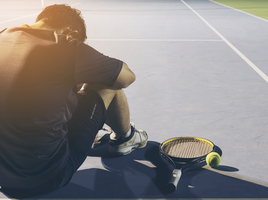Being an athlete can be difficult. Our culture is totally focused on determining a person's value based on his/her performance level and achievements. Personal value is often measured by the value of each performance. This phenomenon has been developing in Western culture for decades, over generations. The judgment and expectations of parents, relatives, coaches, and friends affect how children, from the very beginning, play or try to perform specific tasks. Thousands of studies have confirmed that a child's brain and personality are shaped by the relationships and the quality of the experiences he/she has with the significant others, starting from early childhood. High expectations, positive or negative judgments and the conditional love they have been raised with, shape children's brain and personality, and that leads to an internalization of specific standards that are used to determine their own personal value. Consequently, children develop an inner critic part of their personality that will always have high expectations and make negative self-judgments every time something is not perfect, as well as during - or even before - a performance. The internalization of an inner critic negatively impacts both on the
individual's attitude towards performances and on his/her way of living. This phenomenon is often the root cause of the anxiety or depression that are commonly experienced by professional athletes. Even when an athlete makes the wise decision to seek the help of a Psychologist or a Psychotherapist, changing these inner dynamics is not an easy process. This is mainly due to the presence of the inner critic part, who has always had an influence on the way the person deals with his/her performances. This inner critic has become an important part of the
individual's internal balance and, in spite of being dysfunctional, it still contributes to maintaining this balance. Becoming someone different from who we used to be is always a challenging process. Therefore, athletes may have difficulty in giving up their inner critic because this part seems to push them to do better, to train and to achieve more. Even if athletes may think they are unable to achieve their goals without that part of themselves, actually, the opposite is true. With the help of the right Psychologist, athletes can
disempower the inner critic and shape new parts of themselves, so as to feel less anxious, stop judging themselves and have a more effective attitude towards each performance, both before and during it. These inner parts can help them being more focused, achieving better results, having a less judgemental approach, and enjoying their work much more.
I have personally worked with professional athletes since I started my career as a Psychologist, almost 20 years ago. All over the years, I have helped hundreds of clients changing how they view themselves, as well as how they think, feel and perform. Over the last 7 years, I have used a large mirror during therapy sessions and this has completely revolutionized my work with professional athletes. The use of a mirror within the therapeutic setting and the different experiences that athletes can have while they are in front of it, not only make each change deeper but also speed up the whole process.
This new approach is called Mirror Training Method and is going to have a more and more significant influence on professional athletes' performances.
To get more information, please contact me at info@mirrortrainingmethod.com.
